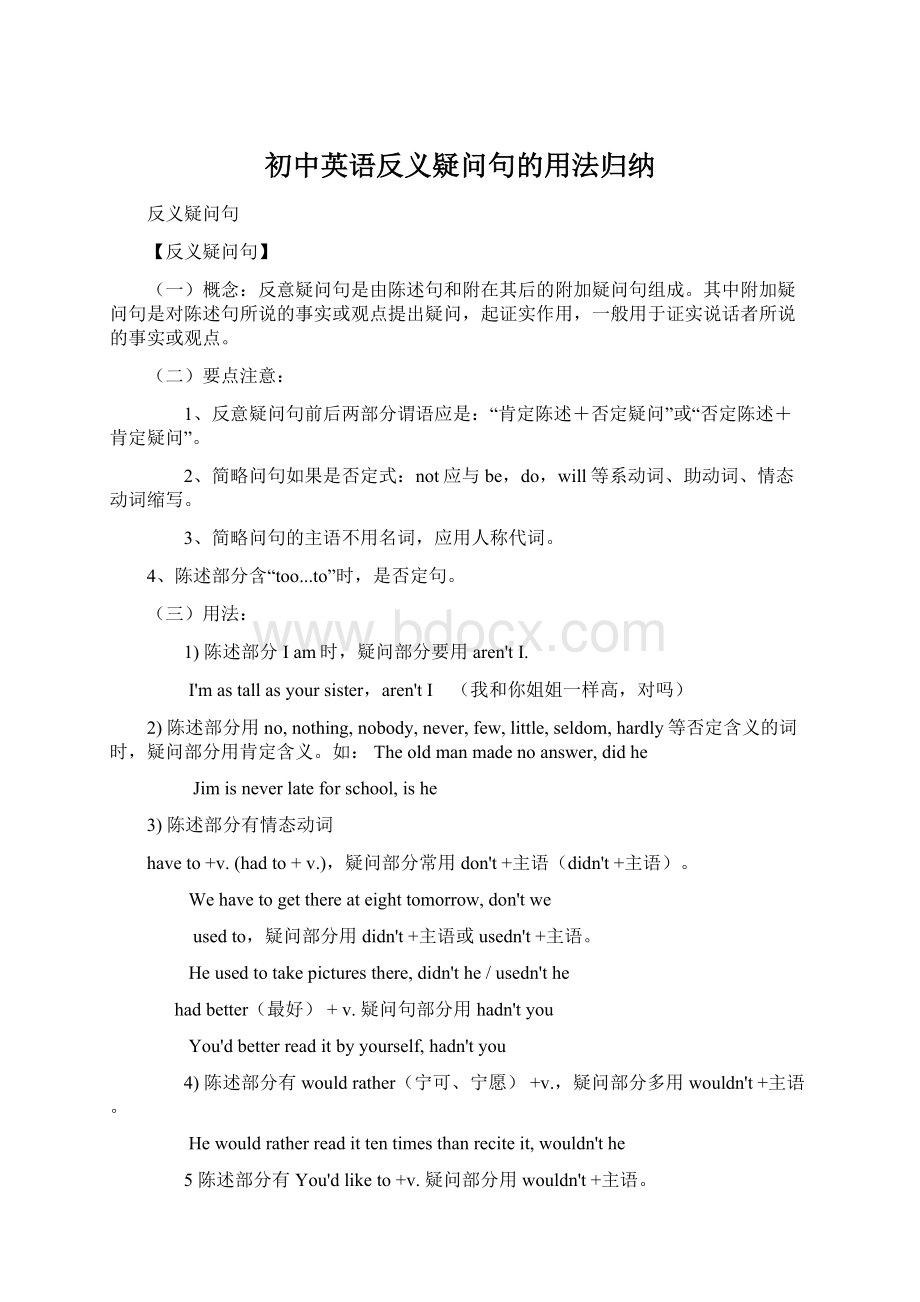初中英语反义疑问句的用法归纳Word格式.docx
《初中英语反义疑问句的用法归纳Word格式.docx》由会员分享,可在线阅读,更多相关《初中英语反义疑问句的用法归纳Word格式.docx(9页珍藏版)》请在冰豆网上搜索。

Wehavetogetthereateighttomorrow,don'
twe
usedto,疑问部分用didn'
t+主语或usedn'
t+主语。
Heusedtotakepicturesthere,didn'
the/usedn'
the
hadbetter(最好)+v.疑问句部分用hadn'
tyou
You'
dbetterreaditbyyourself,hadn'
4)陈述部分有wouldrather(宁可、宁愿)+v.,疑问部分多用wouldn'
Hewouldratherreadittentimesthanreciteit,wouldn'
5陈述部分有You'
dliketo+v.疑问部分用wouldn'
dliketogowithme,wouldn'
6)陈述部分主语是指示代词或不定代词everything,that,nothing,this,疑问部分主语用it。
Everythingisready,isn'
tit
陈述部分主语是不定代词everybody,anyone,somebody,nobody,noone等,疑问部分常用复数they,有时也用单数he.
Everyoneknowstheanswer,don'
tthey(doesn’the)
Nobodyknowsaboutit,dothey(doeshe)
7)think引导的宾语从句:
A.主语是第一人称
Idon'
tthinkheisbright,ishe
Webelieveshecandoitbetter,can'
tshe
B.如果主语不是第一人称则疑问部分与主句相对应构成反意疑问句
Hethoughttheywerewrong,didn'
the(不能说weren'
tthey)
8)省去主语的祈使句的反意疑问句,疑问部分用willyou。
Don'
tdothatagain,willyou
Gowithme,willyou/won'
Let'
s开头的祈使句,后用shallwe(或用shan'
twe)
而Letus开头的祈使句,后用willyou(或won'
tyou)
Let'
sgoandlistentothemusic,shallwe(或用shan'
twe)
Letuswaitforyouinthereading-room,willyou(或won'
9)陈述部分是"
therebe"
结构的,疑问部分用there。
Thereissomethingwrongwithyourwatch,isn'
tthere
Therewillnotbeanytrouble,willthere
10)否定前缀不能视为否定词,其反意疑问句仍用否定形式。
Itisimpossible,isn'
tit Heisnotunkindtohisclassmates,ishe
例题
()1.Don’tforgettogivePollysomefoodandchangeherwater,_______
A.shallweB.willyouC.won’tyouD.doyou
()2.Thereislittlejuiceintheglass,_________
A.isthereB.isn’tthereC.isit
()3.---He’sseldomlateforschool,___________---No.Heisusedtogoingtoschoolearly.
A.isn’theB.hasheC.hasn’theD.ishe
()busisalwayslate,_________---Sure,itis.
A.isnotitB.isn’titC.isn’tthebusD.doesn’tit
()’renewhere,________----Yes,I’mfromDujiangyan.Icameherelastweek.
A.doyouB.don’tyouC.areyouD.aren’tyou
()6.Youusedtobeoutgoing,
A.doyou
B.don’tyou
C.didn’tyou
D.didyou
()7.Hehasneverwatchedsuchanimportantmatch,_____he
A.hasn'
tB.hasC.isD.isn'
t
()havetoworkatonce,______they
A.haveB.haven'
tC.doD.don'
()9.Sheoftenfeelstired,______she
A.doesn'
tB.doesC.isD.isn'
()10.Let'
stakeashortrest,______
A.doweB.aren'
tweC.willyouD.shallwe
()11.Hundredsofpeoplelosttheirlivesintheaccident,_______they
A.don'
tB.didn'
tC.doD.did
()12.---Lilydidn'
tcometoschool,didshe
---____.Shewasillinbed.
A.No,shedidB.Yes,shedid.C.No,shedidn'
t.D.Yes,shedidn'
()isn'
tateacher,isshe
---_____.Sheworksinahospital.
A.No,sheisB.Yes,sheis.C.No,sheisn'
t.D.Yes,sheisn'
()lookslikeLucy,_______
A.isLilyB.isn'
tsheC.doesLillyD.doesn'
tshe
()oftenhaslunchatschool,_____
tTomB.doesn'
theC.doesTomD.doesn'
the
练习
()hardlyhurthimselfintheaccident___________
A.doesn’theB.didn’theC.didheD.doeshe
()2.Let’ssearchtheInternetforsomeinformationaboutfamouspeople,______
A.willyouB.won’tyouC.shallwe
()3.Eric’sneverseenathree-Dmovieatthecinema,_______
A.hasn’theB.hasheC.isn’theD.ishe
()didn’tgotothelecturethismorning,didhe
----______.Thoughhewasnotfeelingverywell.
A.No,hedidn’t.B.Yes,hedid.C.No,hedid.D.Yes,hedidn’t.
()5.—He’salreadybacktoAustralia,_________
—_________.HeisonavisittoShanghai.
A.isn’the;
NoB.hasn’the;
YesC.isn’the;
YesD.hasn’the;
No
()6.—Shedoesn’tlikegeography,doesshe—
___________
.
A.Yes,shedoes
B.Yes,shedoesn’t
C.No,shedoes
()7.He’sflowntoHainanforaholiday,_______he
A.isn’tB.hasn’tC.wasn’t
()8.----Let’sgoskating,_______----OK.Let’sgo.
A.doyouB.don’tyouC.willyouD.shallwe
()9.---Thereislittlemilkinthemilkbag,________there---OK.I’llgetyouanewbag.
A.isB.isn’tC.aren’tD.are
()10.Bob,youwatchedthefashionshowlastnight,________
A.weren’tyouB.didn’tyouC.haven’tyouD.won’tyou
()11.---Areyougoingtothepicnicwithustonight
---Yes.---Youwon’tbelate,________
()12.Thereisnoimportantinformationinthenewspaper,_______
A.isn’tthereB.isitC.isthere
()13.Therearetwolibrariesinthiscity,_______
A.aren’tthereB.aren’ttheyC.aretwo
()14.Mom,mygrandfathergoesforawalkaftersuppereveryday,_______
A.doesheB.isheC.doesn’theD.isn’the
()15.LiuQianhasmade“magic”ahotword,_______he
A.doesn’tB.didn’tC.hasn’tD.isn’t
()aren’taprofessionalathlete,areyou
---______.Iamjustafootballfan.
A.Yes,IamB.No,I’mnotC.OfcourseD.Sometimes
()17.---MillionsofpeopleknowaboutSusanBoylenow,_______
----_______,shebecomeswell-knownbecauseofhersuccessonBritain’sGotTalent.
A.dothey;
NoB.dothey;
YesC.don’tthey;
NoD.don’tthey;
Yes
()18.He’sfedthedogandthecat,_______
A.doesn’theB.isn’theC.wasn’theD.hasn’the
()19.John,cleanyourroom,_______
A.willyouB.shallweC.don’tyouD.doesn’the
()20.Idon’tthinkshehasgonetoBeijing,_______
A.hassheB.hasn’tsheC.doID.don’tI
典型例题:
1B2A。
考查反意疑问句。
因为前面的陈述句little表示否定意义,故后面的简略问句要用肯定形式,选A。
3D4B5D
课后练习:
1C2C3B4B5A6A7B8D9A10B。
由关键词watched可知是一般过去时,故排除A、C、D三项,选B。
11B。
考查祈使句的反意疑问句。
祈使句的反意疑问句后面的简略问句用will/won’tyou,分析比较四个选项可知正确答案为B。
12C。
考查therebe结构的反意疑问句。
therebe结构的反意疑问句后面的简略问句部分仍然要用there。
分析比较三个选项,由关键词no可排除A、B二项,选C。
13A14C15C
16B。
考查对反意疑问句的回答。
回答反意疑问句时要以事实为依据,不管问题的提法如何。
如果事实是肯定的,就要用Yes,事实是否定的,就要用No。
由关键信息“Iamjustafootballfan.”可知“我不是专业运动员”,故排除A、C、D三项,选B。
17D
18D。
题中的He’s是Hehas的缩写,所以后面的简略问句要用hasn’the,故正确答案为D。
19A20
用法讲解
一、基本概念及结构:
反义疑问句又叫附加疑问句,是指当提问的人对前面所叙述的事实不敢肯定,而需要向对方加以证实时所提出的问句。
其结构为:
前一部分是一个陈述句,后一部分是一个简短的问句。
完成后一部分简短问句时,要根据前面陈述句的动词时态和人称来选择适当的助动词进行提问,前后两部分的人称和动词时态要保持一致。
如果前一部分用肯定式,后一部分一般用否定式;
反之,前一部分为否定式,后一部分要用肯定式,即“前肯定后否定,前否定后肯定”。
例如:
Youdon’tlikerockmusic,doyou你不喜欢摇滚乐,对吧
二、其他规则:
1、陈述部分用否定词或半否定词no,nothing,nobody,never,few,seldom,hardly,rarely,little等否定含义的词时,疑问部分用肯定形式。
Heisneverlateforschool,ishe他上学从不迟到,是吗
2、陈述部分的谓语是usedto时,疑问部分用didn’t+主语或usedn’t+主语。
Heusedtotakepicturesthere,didn’t/usedn’the他过去常常在那儿拍照,是吗
Youusedtosleepwiththewindowsopen,usedn’t/didn’tyou
你过去常常开着窗户睡觉,是吗
3、陈述部分为祈使句时,祈使句后加附加问句,不表示反意,而表示一种语气。
否定祈使句+willyou
肯定祈使句+will/won’tyou
Don’tdothatagain,willyou不要再那样做了,好吗
Gowithme,willyou/won’tyou跟我走,好吗
注意:
Let’s开头的祈使句,后用shallwe
Letus开头的祈使句,后用willyou
Let’sgoandlistentothemusic,shallwe让我们去听音乐,好吗
Letuswaitforyouinthereading-room,willyou让我们在阅览室等你,好吗
4、如果陈述句部分的谓语含有带否定前缀dis-,un-,im-或否定后缀-less的词(dislike,discourage,beunfair/untrue/unable,etc.),仍按肯定句处理,其反问部分一般用否定式。
It’sunfair,isn’tit不公平,是吗
Youdislikeit,don’tyou你不喜欢它,是吗
Thepatientisunabletomoveround,isn’the这个病人不能到处走,是吗
5、陈述部分的主语是I,疑问部分要用aren’tI。
I’mlateforthemeeting,aren’tI我开会迟到了,是吗
6、陈述部分主语是指示代词或不定代词everything,that,nothing,this时,疑问部分主语用it。
Everythingisready,isn’tit一切都准备好了,是吗
7、如果陈述部分的主语是不定代词someone(body),anyone(body),everyone(body),noone,nobody等,由于它们是第三人称单数并且指代人,其反问部分的主语可以是they,也可以是泛指第三人称单数的he。
Everyonepassedtheexam,didn’tthey/he每个人都通过了考试,是吗
Someoneiscoming,aren’tthey/isn’the有人来了,是吗
8、陈述部分是“therebe”结构的,疑问部分用there,省略主语代词。
There’snotmuchnewsintoday’snewspaper,isthere今天的报纸上没有什么新闻,是吗
9、含有宾语从句的反义疑问句:
当陈述部分带有宾语从句时,疑问部分的主语应与主句的主语保持一致。
Hesaidthathewouldcometomybirthdayparty,didn’the
他说他会来参加我的生日聚会,是吗
但当主句是:
Ithink,Ibelieve,Isuppose,Iexcept,Iimagine等结构时,疑问部分的主语和谓语动词应与宾语从句的主语和谓语保持一致。
Idon’tbelievehewillsucceed,willhe我不相信他会成功,是吗
Hedoesn’tbelievehewillsucceed,doeshe他不相信他会成功,是吗
10、陈述部分含有must的反义疑问句:
当must作“必须”讲时,其翻译疑问部分用needn’t;
当含有mustn’t(不允许,禁止)时,其反意疑问部分用must/may。
Youmustgonow,needn’tyou你必须走,是吗
Youmustn’tsmokehere,must/mayyou你不可以在这里吸烟,对吗
11、感叹句中,疑问部分用be+主语。
Whatbeautifulflowers,aren’tthey多漂亮的花呀,不是吗
12、陈述部分有You’dliketo+动词原形,疑问部分用wouldn’t+主语。
You’dliketogowithme,wouldn’tyou你想跟我一起去,是吗
13、陈述部分有wouldrather+动词原形,疑问部分多用wouldn’t+主语。
Hewouldratherstayathomethangoout,wouldn’the他宁愿呆在家也不愿出去,是吗
14、陈述部分有haveto+动词原形(hadto+动词原形),疑问部分常用don’t+主语(didn’t+主语)
Wehavetowriteitwithapen,don’twe我们必须要用钢笔填写,是吗
15、陈述部分有hadbetter+v.疑问句部分用hadn’tyou
You’dbetterreaditbyyourself,hadn’tyou你最好自己看,好吗
16、带情态动词dare或need的反义疑问句,疑问部分常用need(dare)+主语。
Weneednotdoitagain,needwe我们不需要重做,是吗
Hedarenotsayso,darehe他不敢如此说,是吗
当dare,need为实义动词时,疑问部分用助动词do+主语。
Shedoesn’tdaretogohomealone,doesshe她不敢独自回家,是吗
三、反义疑问句的回答:
1、一个句子前后保持一致,要么肯定到底,要么否定到底,不能出现Yes,Idon’t和No,Ido的形式。
Youdon’